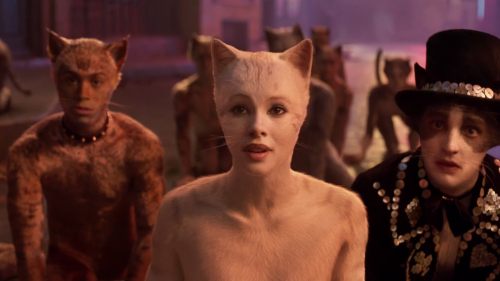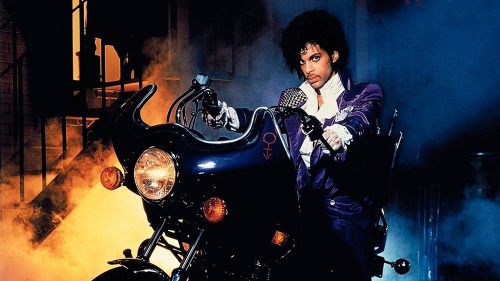Candy-Colored Bummer: THE UMBRELLAS OF CHERBOURG
In honor of La La Land, we're presenting a week of articles inspired by the film. You can buy your tickets here!
This article was originally published on Aug. 26, 2015.
I never expected my mother-in-law’s favorite movie to be so subversive and dark.
That’s not an indictment of either my mother-in-law or her favorite movie, The Umbrellas Of Cherbourg. But most of the stills and word-of -mouth gleaned from Jacques Demy’s 1964 romantic musical might have you, too, thinking it’s a breezy bit of entertainment, a shade more highbrow than something like My Fair Lady. You might even get to the film’s title screen - a brief, lovely moment of umbrella-in-the-rain choreography - and still think you’re in for an old-school song & dance flick. But, as the film that follows illustrates, reality is something else altogether.
Geneviève (Catherine Deneuve) and Guy (Nino Castelnuovo) are in love. You know they’re in love because they seldom stop saying so, and because the colors of their world are glowing just a little brighter than ours, and when they walk together down the sidewalk they float, Spike Lee-style. (I mean, this film is where we realize that all this time Spike Lee's characters have been floating down the sidewalk Jacques Demy-style, but you follow.) We also know these characters are in love because every word of conversation is literal music to their ears: the film is presented in a recitative style, not unlike an opera, in which every line is sung. Dialogue that runs the gamut from soul-baring to expository is all sung along to Michel Legrand’s score. There are no show-stopping “numbers,” per se; rather, every scene in the film is simply, matter-of-factly, carried out in song. When you’re in love, the film seems to be positing, the most mundane conversation feels like Catherine Deneuve singing to you. I think we’ve all been there.
But there’s trouble in this candy-colored paradise: Guy is a poor auto mechanic and Geneviève’s mother (Anne Vernon) warns her against putting too much stock in a fella who “hasn’t even done his military service yet.” Geneviève’s mom, who struggles to keep an umbrella store running, nudges her toward Roland (Marc Michel), a well-to-do jeweler who’s as interested in a 21-year-old Catherine Deneuve as you might expect. Across town, Guy’s sick aunt (Mireille Perrey) is cared for by the shy Madeline (Ellen Farner), who quietly and transparently pines for Guy. Soon, Guy is drafted and Geneviève is left behind, unexpectedly pregnant and wondering why Guy’s letters have, just like her mother predicted, tapered off. As Roland asks for her hand in marriage, Geneviève is left devastated and lost. This is not how it was supposed to go. "I would have died for him,” Geneviève sings of her love. “Why aren't I dead?"

The answer to her question is where the movie becomes something revolutionary. We’ve been conditioned by movie musicals to accept a prefabricated set of conventions regarding romance and cinema, where a ride-or-die approach to love reigns. Geneviève’s mother doesn’t want her daughter to marry Guy, so of course we expect to learn she is somehow involved with Guy’s letters not getting to Geneviève! Nope; she’s just been around the world a little longer and is comparatively wise, and that’s why she quite accurately predicts Guy’s dwindling correspondence while he’s away at war. Roland conveniently shows up in a time of financial need, offering to buy the jewelry Geneviève’s mother is pawning. He must be up to no good! Nope; he’s just a decent man who has wandered into the movie (in this case, quite literally out of another film; Michel played the same character in Demy’s Lola), wanting to share his life with someone after being left behind by another. When Guy returns home from the war to find his love and his child claimed by another, it’s not “go time,” with an imminent showdown between Roland and himself; it’s just a bittersweet reality check. He might wallow in it for a bit, but life goes on, as Guy pulls himself together and builds a life with the waiting Madeline. Geneviève and Guy’s reunion in the film’s last moments, six years after the first scene of the film, gives new, snowy meaning to the word “bittersweet.”
Over and over, Demy subverts our expectations, using beautiful song and glorious color to explore working-class life lessons in a way the 1960s kitchen sink filmmakers across the Channel couldn't have imagined. If this were a Disney musical - hell, if this were any other musical - Roland would be revealed to be a cad, more than likely straight-up evil; Madeline would be conniving and flawed. Demy’s simply not interested in making things so binary. Indeed, Roland and Madeline being good and decent life partners is kind of Demy's point. Reality is not necessarily magical, but neither is it some nightmarish life sentence. Guy and Geneviève age, mature, mellow. Their fires go out a bit, and their brightly colored world becomes muted and gray. But the film leaves us with the message that each have managed to find happiness. It’s maybe not THE happiness they dreamed of, the magical happiness they still mourn but, like Kate Bush sang, you and me won’t be unhappy. Our pain shapes our adult lives; it doesn’t ruin those lives. Demy’s pragmatic, hopeful message is that our heartbreak and sadness are, like our joy, just things we take with us. The world might be less colorful, the reality less fanciful, but the reality of your life will still be quite beautiful, if you accept it. And there will always be something worth singing about.
You can, and should, buy tickets to see La La Land at the Alamo Drafthouse here.



